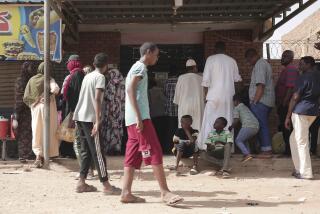Hunger Caused by Drought, War Imperils 350,000 in Sudan
- Share via
NAIROBI, Kenya — More than 350,000 people in southern and northeastern Sudan are at great risk of dying of starvation this summer if the region does not get rain soon, international relief agencies warn, adding that drought-stricken nomads and subsistence farmers may be on the verge of a famine.
The situation of the nomads and farmers is especially dire because an upsurge in fighting in Sudan’s long-running civil war has prevented aid agencies from delivering food to some areas.
“It’s a very serious problem,” said John Sparrow of the International Federation of Red Cross and Red Crescent Societies. “There should be rain [now] and in August, but time is now running out.”
Aid workers say the number of hungry could be much higher than estimated but that the armed conflict and semiarid terrain have rendered many areas inaccessible, making it impossible to come up with a better approximation. Frequent migration of already scattered communities has added to the problem of calculating the number of those in need.
Negligible rainfall over the last two years has eroded pasture areas and led to crop failures in the Red Sea Hills, an area in northeast Sudan almost twice the size of the state of South Carolina. Sparrow said that at least 300,000 Beja nomads, whose camels and goats have died of starvation or dehydration, are at risk now; malnutrition is on the rise.
In the vast southern province of Bahr el Ghazal, about 600 miles southwest of the capital, Khartoum, flooding last season washed away huge, low -lying crop -growing areas. This year, drought will again reduce harvests.
Jacob Akol, a spokesman for World Vision International, said an assessment conducted earlier this year by his agency, the World Food Program and the Sudan Relief and Rehabilitation Assn. concluded that at least 55,000 people need food in areas of Bahr el Ghazal.
There have been no reports of widespread starvation deaths yet, and relief officials say they do not wish to raise premature concerns. But they say vigilance must be the watchword.
“If we don’t ring the alarm bells until after people start to die, it’s too late,” Sparrow said. “The question will always be: When do you intervene? How do you define what is ‘dire need’? If we leave it until we start to see people as skeletons, as we did in the 1980s, then we’ve all failed.”
Concern has been heightened because countries across Africa are suffering the consequences of drought. In Tanzania, almost 4 million people have reportedly been affected; 600,000 are receiving emergency food aid. Kenya last year appealed for help for 1.6 million drought victims. Areas of Ethiopia, Eritrea, Niger, Chad and Mauritania have been stricken by drought in recent months.
The diet of the Sudanese nomads and farmers is chiefly sorghum plus meat and milk from livestock. With these staples in scant supply, many Beja have resorted to the only method of survival they know: reducing their food intake to the absolute minimum and making charcoal from available wood and woven mats from palm trees to sell.
While such tactics have helped to avert a disaster for now, they are stopgap measures at best, aid workers stress. They note that prices for charcoal, now abundant, have plummeted, that the region’s wood supply is quickly being depleted and that food is growing more scarce in the towns.
*
As hunger spreads in Sudan, the country’s civil war is also intensifying.
The internal conflict started more than 40 years ago, though a peace accord was signed in 1972.
The current combat pits rebels from the predominantly black African, animist and Christian south against the government forces of the Muslim and ethnic Arab north. The south is pressing for increased autonomy, exemption from Islamic laws and a fair share of the money available for development.
Recent reports indicate that the insurgent Sudan People’s Liberation Army plans to step up operations in eastern Sudan, which would encompass the drought-stricken Red Sea Hills region. “If we combine a famine with conflict, then we’re really getting into a complex emergency,” Sparrow warned.











